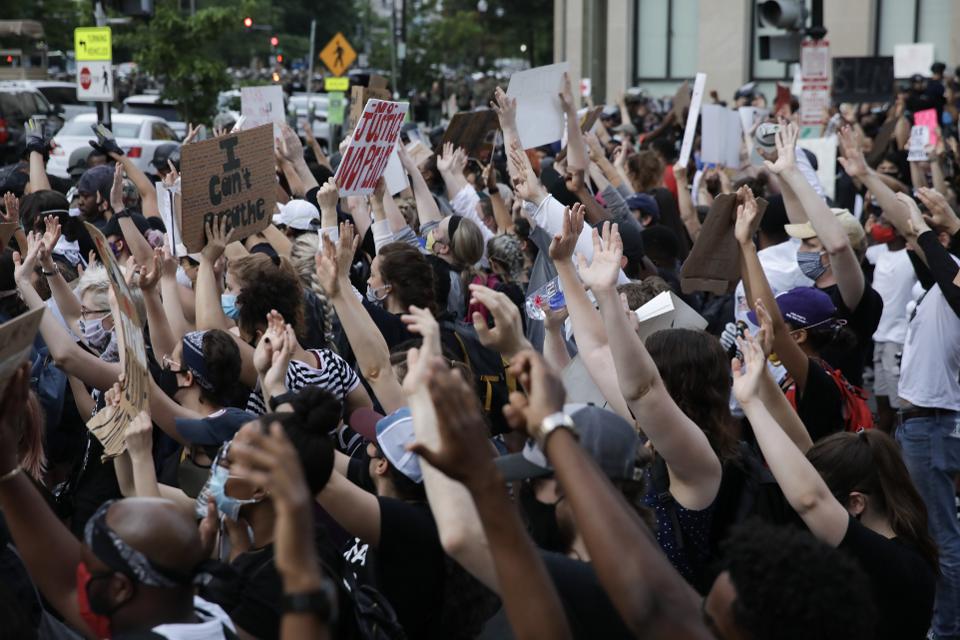
In the weeks since the first marches protesting against the extrajudicial execution of George Floyd (and there will be weeks to come — this is a marathon, not a sprint), a lot of brands, business leaders, and individuals have spoken up in support of the Black Lives Matter movement. Many have made pledges to do better, to hire better, to be more supportive of their BIPOC employees, and to promote BLM messaging wherever they can. And that’s great. That’s important.
It’s not everything, though, and many black industry professionals have publicly noted that while the well-meaning statements are appreciated, they aren’t everything. Some of them aren’t even much. And some of them reveal gaps in understanding and practice that themselves need to be addressed.
The work isn’t done, is the point, and some of it is barely done, or hasn’t even really been started. These three articles, among others, give on-the-ground perspective on that fact.
Thank you, but no thank you.
Shanice Mears, co-founder and head of talent at The Elephant Room, responds to an open letter signed by advertising industry leaders pledging to support BIPOC talent and hold the industry accountable for its failures in the area of racism: A response to ADLAND: Thank you, but no thank you
I read an open to letter Adland yesterday and I’d like to respond with some thoughts.
[…]
My first point will talk directly to those leading and of influence who have pledged. How dare you? A part of me is thinking I’m suppose to be grateful, but in fact that’s how a lot of black people feel when they even get a job at an advertising and/or Brand in the first place a mindset thinking ‘Thank God they picked me’ not because they fear they aren’t good enough but because they fear being black would have set them back initially. Ask yourself as a white person, have you ever gone into work afraid of the hairstyle you have? Have you ever gone into work questioning if its ok to bring in something home cooked? Do you know what it feels like to be consistently asked where did you come from (in confusion)?. Chances are, probably not. And that’s your privilege.
As a young black female, who works very hard by myself and with my team that those who identify as non-white, especially black people have consistent support and access to opportunity without questioning is it the right thing to do. I have to ask myself is this genuine and are you ready to work?
I’d like to know why has it taken a man to die, a world to protest, an online movement telling you black lives matter for you to consider that black talent is worth investing in?
“A response to ADLAND: Thank you, but no thank you,” Shanice Mears
Professionalism in the age of black death
Writer Shenequa Golding speaks to the challenges of maintaining quote-unquote professionalism while the world is burning: Maintaining Professionalism In The Age of Black Death Is… A Lot
Between Amy Cooper’s Oscar worthy Central Park performance, Ahmaud Arbery shooting death in Georgia, Breonna Taylor’s assassination inside her Louisville home, and the Minneapolis murder of George Floyd, black people in America are running on fumes.
We’re tired, angry, confused and yet, this space is familiar to us. This place of torment and trauma has become a home of sorts. The cycle begins in the far corners of Twitter with rumblings of a killing. Then a recording of the victim’s last moments pop up and shortly after, we finally learn the person’s name.
[…]
And while some of us take to the streets, the rest of us have to hide these shared feelings behind professionalism.
I don’t know who decided that being professional was loosely defined as being divorced of total humanity, but whoever did they’ve aided, unintentionally maybe, in a unique form of suffocation.
“Maintaining Professionalism In The Age of Black Death Is… A Lot,” Shenequa Golding
Dear white corporate America
Omar Johnson, former CEO of Beats by Dre, former VP of marketing at Apple, and founder of brand studio OPUS United, writes an open letter to corporate America’s blind spots in serving black consumers and profiting from black culture: Dear white corporate America
Dear white corporate America,
I get it. I know you have the best intentions.
I know you’re horrified and heartbroken by the killings of Ahmaud Arbery, George Floyd, Tony McDade, Breonna Taylor, and too many others to name.
You want to take a stand against the racial injustice and anti- Black prejudice built into the very foundation of America. You want to do the right thing. But you just don’t know how.
Is that about right?
I know it is, because you’ve been calling me. For the past two weeks, several times a day, it’s been the same question: What can I do?
Let me break it down for you.
For starters, the fact that you’re only asking now is part of the problem. Companies have been profiting off Black culture and Black consumers for decades.
“Dear white corporate America,” Omar Johnson
And always remember that black lives matter.

